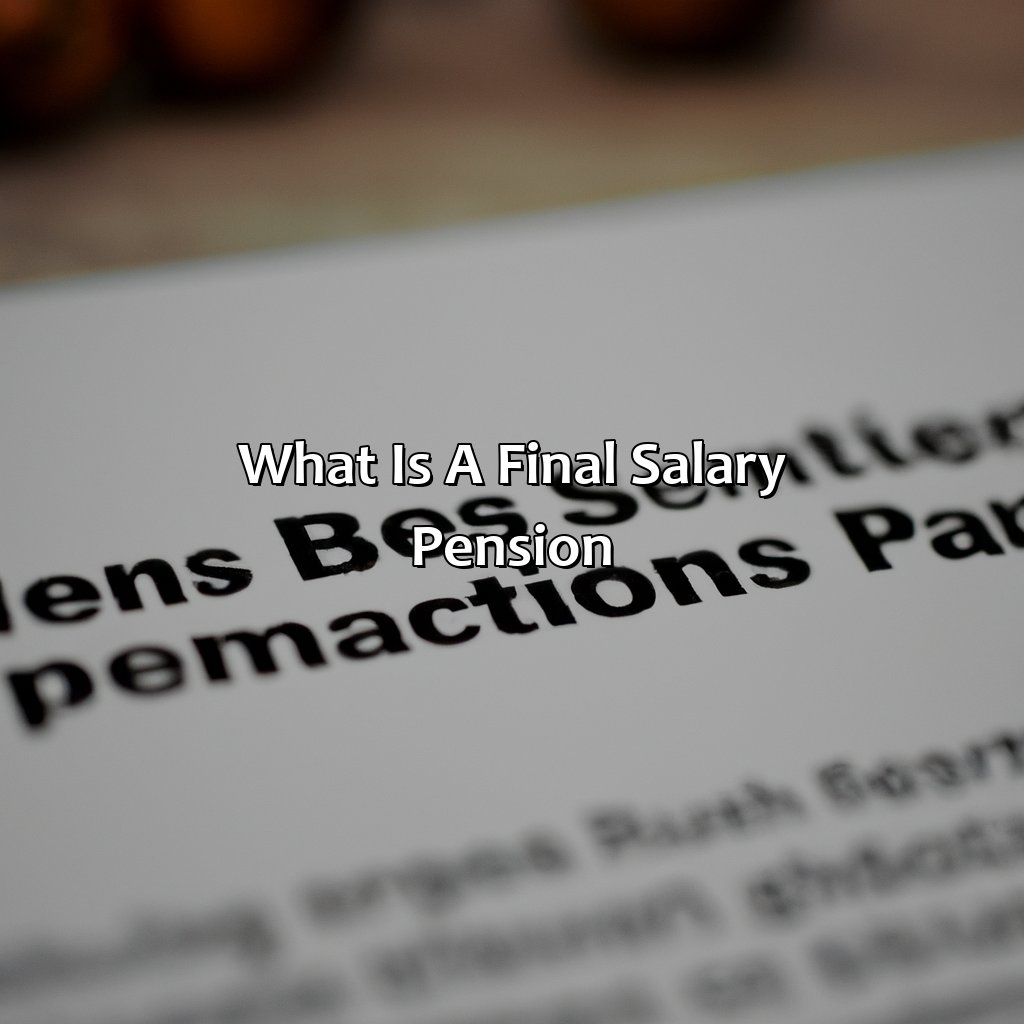What Is A Final Salary Pension?
Key Takeaway:
- A final salary pension is a type of defined benefit pension plan that promises to pay retirees a specific amount of money based on their final salary before retirement.
- The calculation of benefits in a final salary pension is usually based on a combination of years of service and final average salary at retirement.
- The advantages of a final salary pension plan include a guaranteed income in retirement, inflation protection, and no investment risk. However, the plan may be at risk if the sponsoring employer goes bankrupt, and the pension income may not keep up with inflation.
- Options for final salary pension holders include transferring to a defined contribution pension scheme, taking a lump sum, or continuing with the final salary pension plan.
Are you considering your retirement options? A final salary pension could be the right option for you. Discover the benefits of this type of pension and how to decide if it is the right choice for you. You will be better informed to make the best decision for your future.
Definition of Final Salary Pension
In the world of pensions, a final salary pension is a retirement plan where the amount of money an individual receives is based on their salary at the end of their employment rather than the amount of money they contributed to the pension plan. This type of pension is typically offered by employers as a form of employee benefit. Final salary pensions are often more beneficial for employees who are in higher paying jobs and have worked for a long time with the same employer. The amount an individual receives from a final salary pension is usually seen as a guaranteed income for life, which can be an attractive feature for retirees.
One important detail to note is that final salary pensions are becoming rarer, and many employers are moving towards defined contribution plans. A defined contribution plan is where an individual contributes money into their pension plan, and the amount they receive in retirement is based on how much they have contributed and how well their investments have performed over time. If you’re curious about how much is an average pension, you should consider your options for retirement plans.
If you have a final salary pension, it is important to keep track of the estimated amount you will receive in retirement. You may also want to consider your options if you are offered a lump-sum payout in lieu of a traditional pension. It can be beneficial to seek the advice of a financial advisor to help you understand the options available to you and make the best decision for your retirement.
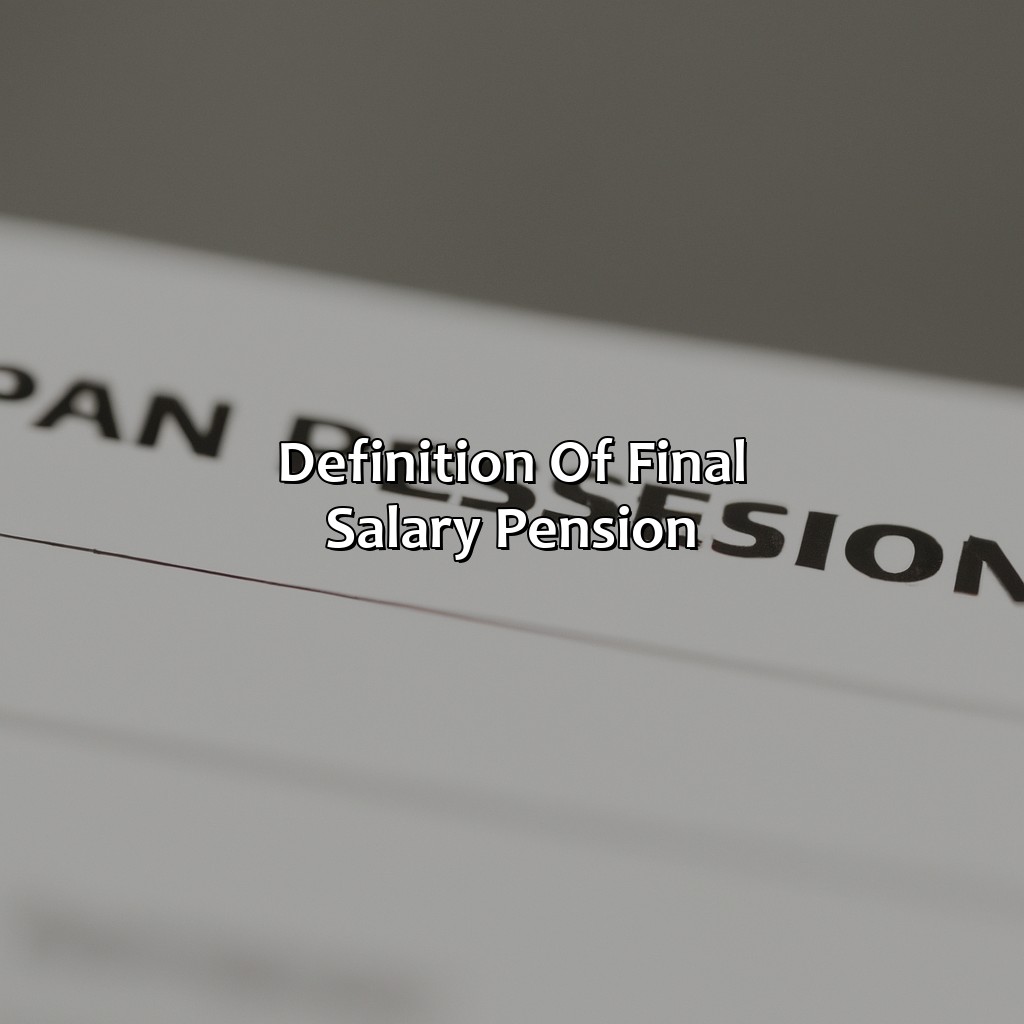
Image credits: retiregenz.com by Adam Duncun
How Final Salary Pension Works
Let’s dive into the final salary pension and its unique benefits. To work out what you will receive, we must calculate your benefits. This takes into account salary and length of service. Additionally, to know when you can start receiving benefits and how much, we must look at retirement age and benefits.
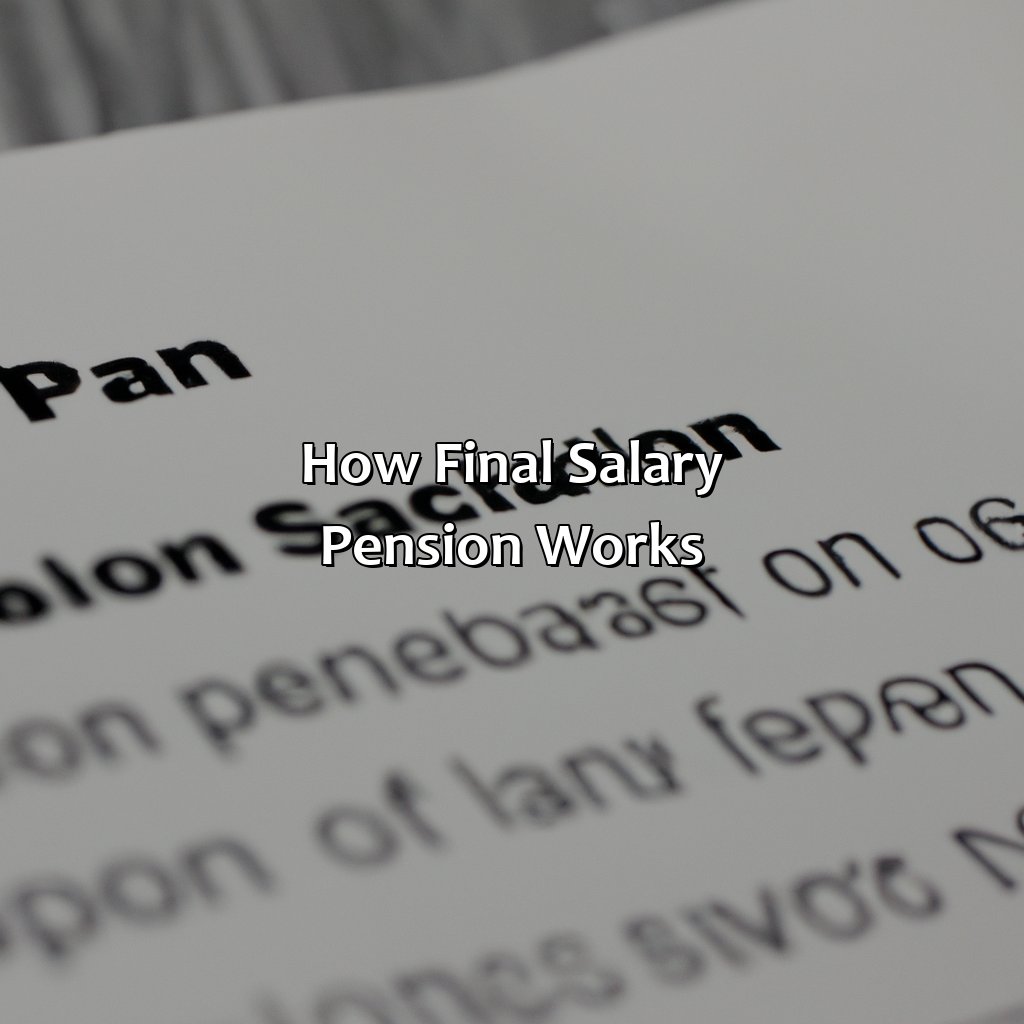
Image credits: retiregenz.com by James Washington
Calculation of Benefits
The computation of Retirement Benefits
Retirement benefits are granted based on different factors using a mathematical formula to estimate the retirement pay-out. Factors considered when calculating the payments include years of service, salary history, and age at retirement. There are more intricate details that may arise in self-contributory plans like 401(k)s.
- Years of service regularly determine an employee’s benefit value
- Your average salary over a period will be used for calculating payouts
- The employer will use specific formulas to establish how much you can receive
- Your earliest start date determines your benefit calculated by years of service per year
- Spouses may share benefits if they have elected to join the plan.
Additionally, other considerations factor in determining pension payments such as cost-of-living adjustments (COLAs) and early retirement options. COLAs account for inflation, so payments do not lose their value with time.
A Pro Tip is to get started with retirement planning early because the nearer you are to your retirement age without starting contributions leads to lower payouts at retirement. Wondering about how much is the retirement pension in Philippines?
You know you’re getting old when the candles on your birthday cake cost more than the cake itself – but with a final salary pension, retirement age is just a number!
Retirement Age and Benefits
A pivotal aspect of retirement planning concerns the actual Retirement Age and its Benefits. Final salary pensions are based on the number of years worked and final salary at retirement. There is no set retirement age, but an employee may receive the benefits from as early as 55. The longer an individual waits to commence their pension, the higher the income.
It’s essential to acknowledge that a higher salary typically results in a more generous pension payment during retirement. Moreover, working beyond the current state pension age can be beneficial because the individual will enjoy differentiated increments in their entitlements. It is important to study how this type of pension plan works well ahead of time so that individuals know how much they can expect to receive when they retire.
Additionally, it’s vital to note that these types of pensions have become less prevalent over recent years because many companies shifted to alternative defined contribution schemes like personal or workplace pensions.
According to Aegon Pension Calculators*, if one earns 30k per annum and has worked for 25 years with average annual accrued benefits, he/she could retire on 10k yearly (inflation-linked) private pension upon reaching 60-65 years of age. Wondering what is the average pension for a nurse? Check out our website for more information.
*Source: https://www.aegon.co.uk/pensions/defined-benefits-pension-calculator.html
Final salary pension: where you can retire comfortably or die waiting for your first payout.
Advantages and Disadvantages of Final Salary Pension
To learn about the ups and downs of a final salary pension, delve into the two sub-sections – advantages and disadvantages. Check out the pros and cons. That way you’ll be able to make the best decision for your retirement income.
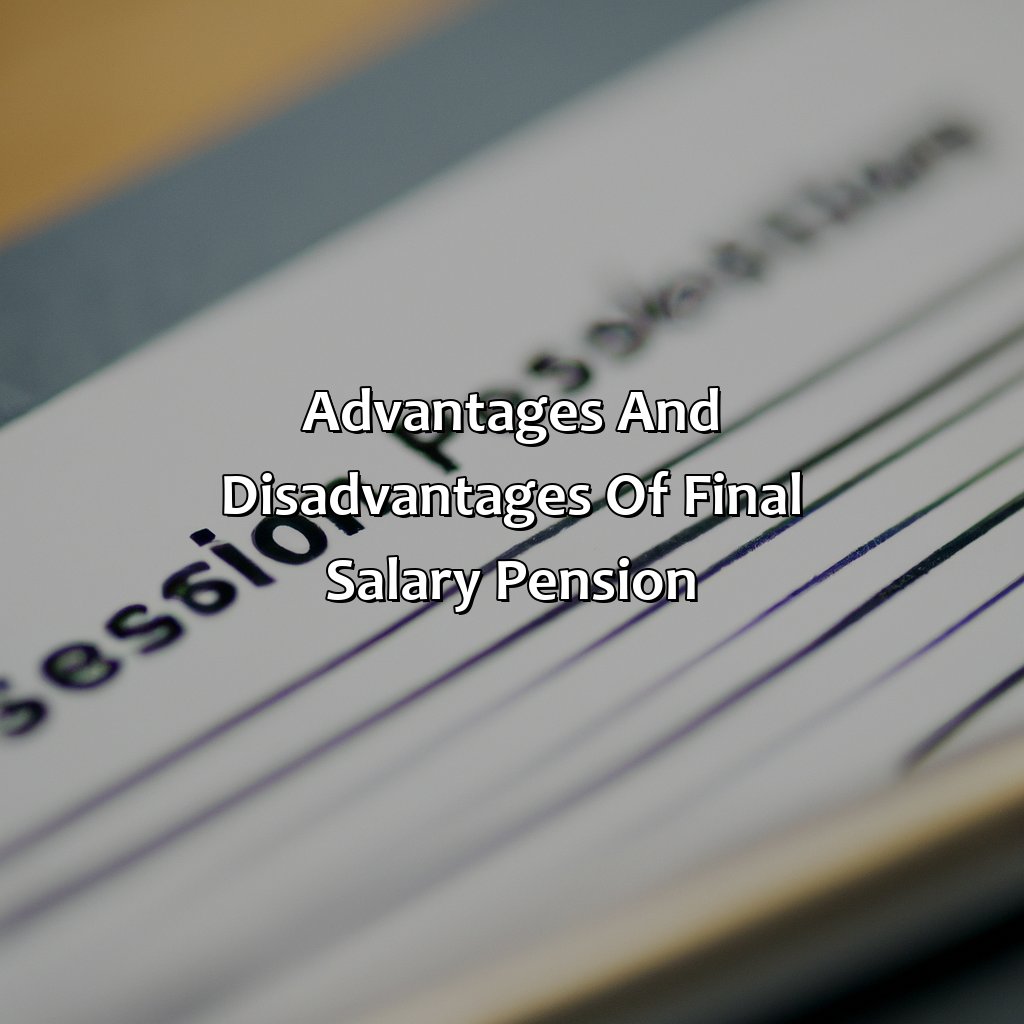
Image credits: retiregenz.com by Yuval Duncun
Advantages
One benefit of a final salary pension is its reliability in providing a guaranteed income for life based on the employee’s salary and years of service. This offers financial security, especially during retirement. Another advantage is that the employer is responsible for managing the investments, removing the burden from the employee. Additionally, final salary pensions often have inflation protection, increasing with the cost of living.
It should be noted that not all employees are eligible for this type of pension and it may be phased out by some companies. Furthermore, employers can face financial strain when managing these pensions, leading to potential cuts or plan freezes. Additionally, employees cannot take out lump sums or control their investments as they are managed by the employer. If you are looking for more flexible options, you may consider a pay as you go pension plan.
Compared to other types of retirement plans such as defined contribution plans, final salary pensions provide a steady income stream but lack flexibility. They also heavily depend on factors such as longevity and market conditions. If you are wondering how much a widows pension is in a final salary pension scheme, it would depend on various factors such as the specific scheme rules, the length of service, and the deceased member’s salary.
A former employee named Sarah shared her experience with final salary pensions with us. She valued its stability but was unable to transfer it to another retirement account when she changed jobs. However, she feels grateful for the consistent income provided during her retirement years. To understand more about pensions, you can learn about CETV value of a pension.
Sorry to burst your bubble, but final salary pensions aren’t always the gold-plated retirement solution they’re cracked up to be.
Disadvantages
A Look at the Limitations of Final Salary Pension Scheme
Final Salary Pension Scheme, also known as Defined Benefit Pension Plan, comes with unique benefits that make it an attractive retirement investment option. However, despite the advantages provided by final salary pension plans, there are some limitations that may not be ideal for some investors.
- Limited Flexibility: Unlike other pension plans, the terms and conditions of final salary pensions cannot be easily changed to accommodate the changing needs of investors.
- Employer Dependency: The value of your final salary pension is often dependent on your employer’s financial health. This can pose a significant risk if your employer goes bankrupt or experiences financial difficulties.
- Potentially Lower Retirement Income: Since final salary pensions take into account a member’s length of employment and final salary before retirement, younger members who have not spent much time in service may receive smaller payouts upon retirement.
- Higher Taxation: Final salary pensions are subject to higher taxation rates compared to other forms of personal investments and savings.
- Inflation Risk: Your final salary pension payout may decrease in value since it might not take into account inflation rate changes later in life.
- Not Portable: Final salary pensions are unique to each company so that they cannot be transferred to another employer should you decide to switch jobs.
It is important to note these drawbacks when considering a final salary pension plan; however, It should not hinder one from investing in this plan if it provides the desired risk profile and returns.
Lastly, one English man had his job security questioned after being dumped from his job following years of service because he was five years off from his retirement date under his firm s Defined Benefit program. This proves why a static formula like ‘years worked+’ is just too arbitrary when providing long-term employment security. Final Salary Pension holders have options; it’s just a matter of choosing between enjoying retirement or surviving on ramen noodles.
Options for Final Salary Pension Holders
Explore your options if you’re a Final Salary Pension Holder! Sub-sections include:
- Transferring to a Defined Contribution Pension Scheme
- Taking a Lump Sum
- Continuing with Final Salary Pension Plan
Know the advantages and disadvantages of each before you decide. It’s important to understand them fully.
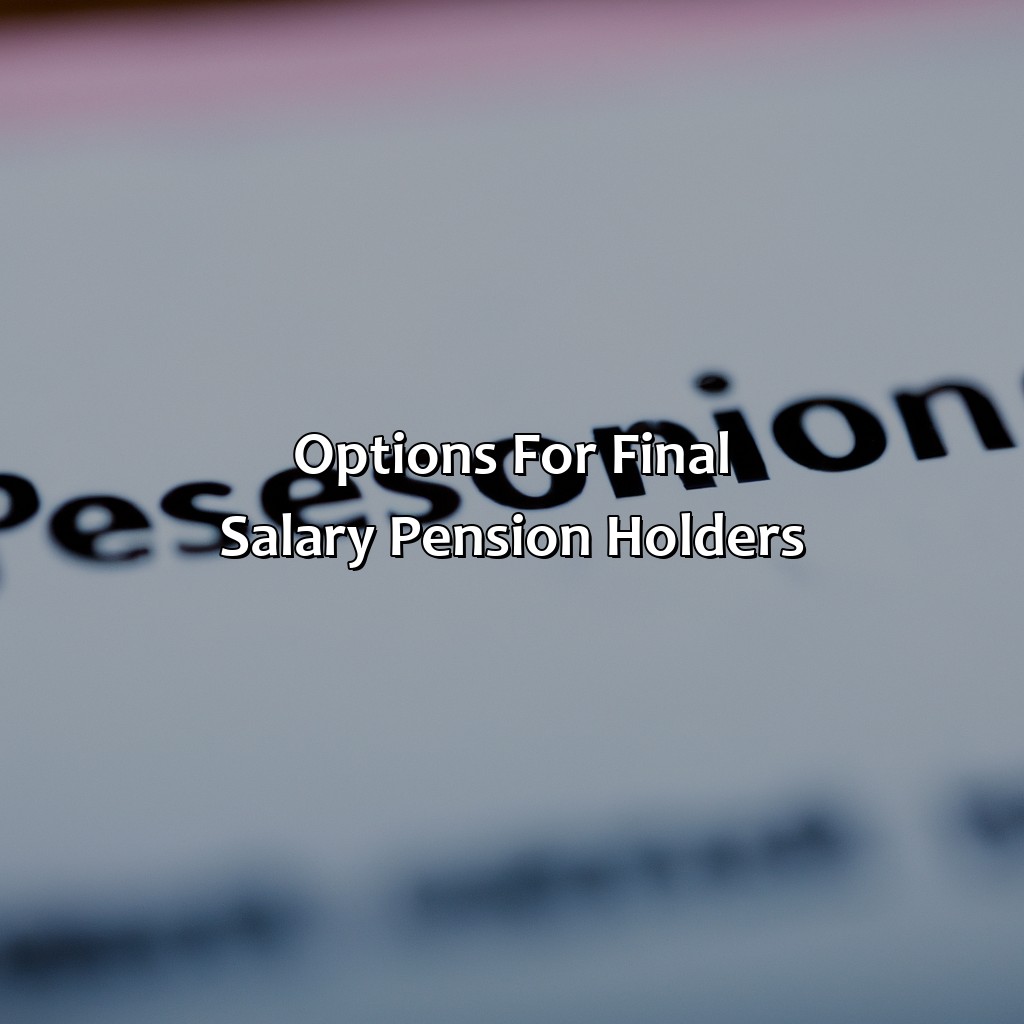
Image credits: retiregenz.com by Adam Jones
Transferring to a Defined Contribution Pension Scheme
If you are considering moving away from a final salary pension, an option is transferring to a defined contribution pension scheme. This involves a one-time lump sum payment with potential tax implications. Consult a financial advisor for guidance before making any decisions.
A transfer to a defined contribution plan provides more flexibility in terms of investments and access to funds. It also allows for greater control over retirement planning. Careful consideration is essential since this move may lead to costly fees, investment risks, or the potential loss of guarantees associated with final salary pensions.
It s crucial to note that not everyone is eligible for this type of transfer. Additionally, if you have less than 30,000 in your final salary pension fund or are within a year of retirement, the transfer may not be as beneficial.
Don’t miss out on securing your financial future- talk to an experienced financial advisor about what options are best suited to your needs and goals.
Don’t put all your eggs in one pension basket, but if you do, make sure it’s a big enough basket to take a hefty lump sum.
Taking a Lump Sum
Retrieving a lump sum from your final salary pension became a choice, as is specified in the latest terms and conditions. The lump sum is largely tax-free when you retire. However, it’s vital to bear in mind that the lump sum will decrease the total value of your pension pot; which implies that your yearly annuity payouts after retirement would be decreased. This sacrifice can fluctuate since providers provide different values for their commutation rates based on various conditions including how much you opt to extract.
A one-time lump-sum payment withdrawal may also impact future preservation requirements and obligation during the retirement era. There are alternative opportunities for extracting funds such as receiving enhanced annuities premiums or deferring collection until a latter day if this does not fulfill your financial objectives or needs.
It is worth noting that employers have permitted their employees to extract their pensions before tax laws came into place – after all, they are required by law to fulfill their obligations as trustees first and foremost. As such, early retirees could receive higher returns at an improper tax rate, which was taken advantage of by many individuals already receiving massive amounts with minimal deductions due to their monetary level.
Who needs a crystal ball when you have a final salary pension plan? It’s like having a financial time machine.
Continuing with Final Salary Pension Plan
For those considering retaining their Final Salary Pension, it is essential to know the terms and conditions. You must analyze whether your plan offers guarantees or indexation once you retire. To ensure a successful retirement future, one must consider keeping their final salary pension open as it provides a reliable income throughout your lifetime.
Additionally, continuing with your final salary pension means that you do not have to worry about adjusting the amount based on inflation or other fluctuations in the economy. A critical factor to consider is assessing how long your pension will last and how much income you will need for your retirement regularly.
Retain control of your Pension pot by keeping track of its value. It’s important to keep tabs on things like interest rates and other economic factors that may influence pension values so that you can make informed decisions about how much is Pension in UK and how much money should be withdrawn at various points during retirement.
Lastly, individuals who have held final salary pensions for many decades have suggested that their pension payouts are better than ever before because of several factors, one being systematic investing. This simply means that regular paying towards pensions over many years leads to better results when accumulated and invested in strategic portfolios.
If you’re wondering what is an occupational pension, it’s a type of retirement plan that’s sponsored by employers for their employees and provides guaranteed retirement benefits based on factors such as salary and length of service.
As history has shown us, continuing with a final salary pension has proven to be beneficial for retirees as they provide assurance concerning the compensation necessary to sustain your financial security post-retirement. Do you want to know how much a 70K pension is worth?
Five Facts About Final Salary Pensions:
Final salary pensions, also known as defined benefit pensions, provide a guaranteed income in retirement based on salary and years of service. (Source: Money Advice Service)
Final salary pensions are becoming increasingly rare, with many companies offering defined contribution pensions instead. (Source: The Guardian)
The amount you receive from a final salary pension is typically calculated based on a formula, which may take into account factors such as final salary and length of service. (Source: Pension Wise)
Final salary pensions are typically more expensive for employers to provide than defined contribution pensions, which may be why they are becoming less common. (Source: BBC News)
Final salary pensions are designed to provide a guaranteed income for life, which can provide greater security in retirement. (Source: MoneySavingExpert)
FAQs about What Is A Final Salary Pension?
What is a final salary pension?
A final salary pension plan is a defined benefit pension scheme provided by an employer that pays out a guaranteed pension income in retirement based on an employee’s final salary and length of service.
How does a final salary pension work?
Under a final salary pension scheme, the employee contributes a percentage of their salary each month, and the employer pays in a larger percentage. When the employee reaches retirement age, their pension is calculated based on their final salary and length of service.
What are the advantages of a final salary pension?
The advantages of a final salary pension are that employees have a guaranteed income in retirement, which is not dependent on investment returns. The pension income is also usually inflation-protected.
What are the disadvantages of a final salary pension?
The disadvantages of a final salary pension are that they are expensive for employers to provide, and employees may not have control over how their pension funds are invested. They also may not be portable if an employee changes jobs frequently.
Can I still join a final salary pension scheme?
It is unlikely that you can join a final salary pension scheme as they are becoming less common as most companies now offer defined contribution schemes instead.
What should I do if I have a final salary pension plan?
If you have a final salary pension plan, it is advisable to seek financial advice to ensure you understand your pension benefits and options. You may also want to check the scheme’s rules to see if you are able to transfer your pension to an alternative scheme.
 Checkout this IRS Loophole
Checkout this IRS Loophole 
